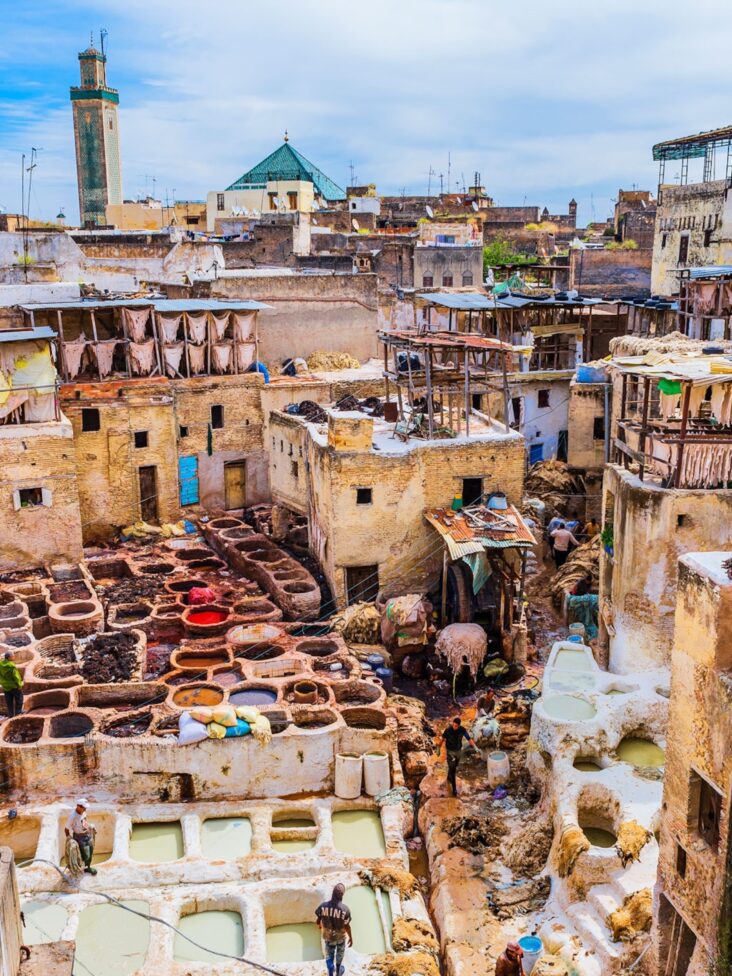There is no better way to experience the beauty and culture of Morocco than by travelling around the country. From the Imperial Cities of Rabat, Meknes and Fes, to the breathtaking High Atlas Mountains and ancient Roman ruins, Morocco is a country full of wonders and surprises. From the stunning beaches of Essaouira to the bustling souks of Marrakech, Morocco has something to offer to everyone. Whether you’re looking for a relaxing beach holiday, an exciting adventure or a cultural experience, Morocco has it all. Read on to discover the best places to visit in Morocco and start planning your next dream holiday today!
Marrakech: Marrakech is a bustling city of vibrant culture, bustling markets, and stunning architecture

Marrakech is one of the most exciting and vibrant cities in Morocco, the perfect place for anyone looking for a unique travel experience! The iconic markets of Marrakech, known as souks, are filled with amazing treasures and souvenirs, from colorful pottery and intricate carpets to spices and local crafts. If you’re looking for a dose of culture, be sure to explore the historic medina, where you’ll find the iconic Koutoubia Mosque and the El Badi Palace, a stunning 16th-century palace with fantastic views of the city. The city’s bustling Jemaa el-Fnaa square is the perfect place to get a real taste of Marrakech, with its vibrant street performers and delicious street food. Whether you’re looking for a dose of culture, to shop til you drop, or to just take in the sights, Marrakech is the ideal destination for your next vacation!
It is one of the top tourist destinations in Morocco and home to the country’s largest souks.

Morocco is an amazing country to explore, and its capital city, Marrakech, is one of the most popular destinations for travelers. Marrakech is renowned for its bustling souks, or markets, and the largest souk in Morocco can be found here. The souk is an amazing place to explore and an incredible opportunity to find unique local goods, from spices and pottery to carpets and jewelry. The sights and smells of the souk will transport you to a different world and make for a truly unforgettable experience. Whether you prefer to wander the winding alleys of the souk, barter for goods, or take a guided tour, a visit to Marrakech’s souks is an essential part of experiencing Morocco.
Fez: Fez is an ancient city with a rich history, and it is a great place to explore the narrow alleyways and ornate mosques

Fez is a must-see destination for any traveler to Morocco. This ancient city is full of culture and history, with narrow alleyways and ornate mosques. With its unique medina and souks, Fez is the perfect place to explore Moroccan traditions, culture and cuisine. Don’t miss out on the famous leather tanneries where you can observe the traditional process of leather-making. There are also plenty of restaurants and cafes to try, as well as markets to explore. Whether you’re looking for souvenirs, hand-crafted goods or simply a good meal, Fez has something for everyone. For those looking to experience a little bit of everything, Fez is the perfect destination.
Fez is also a great place to explore the traditional Moroccan arts and crafts, such as leatherwork and pottery.

Fez is a must-see destination in Morocco! It’s full of amazing traditional arts and crafts, like leatherwork and pottery. The Leather Tannery is one of the most iconic sights in Fez, where you can see how the locals dye and treat leather. You can also explore the many pottery shops to find some unique souvenirs and gifts. Plus, the Medina in Fez is a huge outdoor market with an endless variety of items. Whether you’re looking for traditional art, handcrafted jewelry, or colorful fabrics, you’ll find it in the vibrant streets of Fez. From cultural experiences to the vibrant markets, Fez is the perfect place to explore the traditional Moroccan arts and crafts.
Chefchaouen: Chefchaouen is a small mountain town with a beautiful blue-washed old town

Chefchaouen is the perfect destination for anyone looking for a unique experience in Morocco. The blue-washed old town is like nothing else in the world – it looks almost like something out of a fairytale. The streets are filled with artisanal shops, colorful markets, and delicious local cuisine. It’s the perfect place to spend a few days exploring the culture, architecture, and historical sites of the city. Plus, the mountain setting of Chefchaouen makes it a great place for nature lovers, hikers, and photographers. With its beautiful blue-washed streets and stunning mountain views, Chefchaouen is a must-see destination for anyone visiting Morocco.
It is known for its picturesque streets and for its relaxed atmosphere.

Morocco is the perfect place for a relaxed getaway. With its stunningly beautiful streets and laid-back atmosphere, it’s the perfect destination for a peaceful vacation. Whether you’re looking to explore the ancient souks of Marrakech, take in the stunning views of the Atlas Mountains, or go on a camel ride through the Sahara Desert, Morocco has something for everyone. With its vibrant culture and diverse landscape, it’s no wonder why so many people flock to Morocco each year. From the winding alleys of Fes to the stunning beaches of Essaouira, there’s something for everyone in this beautiful country. So if you’re looking for a quiet escape, Morocco is the perfect place for you.



